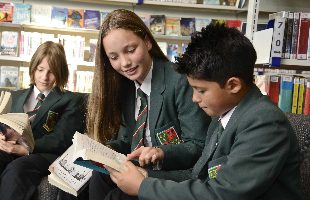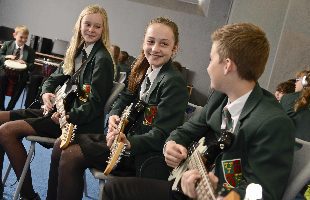Learning Support
Year 7
The Rationale
Interventions are reviewed annually and are developed as the needs of the students change. These are interventions that we have and/or are running. The list is not exhaustive
| Intervention | Duration | Target Participants and Identification | Aim | How can you help your child engage with the content? | Curriculum Opportunities | Progress |
|---|---|---|---|---|---|---|
| 1;1 Reading | Each child approx. one 1hr lesson a week for undetermined time | Pupils with very low standardised scores (approx. below 77).Pupils identified after primary school visits, after Year 7 reading tests and recommendations from staff | To increase reading accuracy and comprehension through individualised programme | Encourage reading in everyday situations, play word games, promote reading | Supports all areas of the curriculum | Difference between start and end data plusTracking of English levels |
| Target 7 | 1 session a week for approximately 10 weeks | Pupils on ASC spectrum, pupils with language difficulties and social difficulties Identified through primary school visits, SAT reports, EHCP reports and KKS staff | To improve skills related to the interactive process of communication | Support with organisation- preparing for the next day, homework etc.Discussions, playing board games etc | Supports all areas of the curriculum | For those with EHCPs progress is measured as part of review process. |
| IDL Dyslexic programme | Initially for 10 weeks. Resource then available at home | Pupils with a dyslexic profile, low reading age, comprehension and processing difficulties, poor spellingPupils identified after primary school visits and recommendations from English Department | To improve reading skills- fluency, comprehension, spelling | The resource can be accessed at home. Ideally complete for 20 minutes 5 times a week | Supports all areas of the curriculum | Improvement from base line assessment at start of interventionImproved reading levels |
| Mentoring | Usually 1 lesson in the 2 week timetable | Pupils with an EHCP | To help the transition from primary to secondary, build links between school and home and work on areas identified in the EHCP | As identified in EHCP and support plans | Supports all areas of the curriculum | Reviewed at EHCP reviews |
Year 8
The Rationale
Interventions are reviewed annually and are developed as the needs of the students change. These are interventions that we have and/or are running. The list is not exhaustive
| Intervention | Duration | Target Participants and Identification | Aim | How can you help your child engage with the content? | Curriculum Opportunities | Progress |
|---|---|---|---|---|---|---|
| 1;1 Reading | Each child approx. one 1hr lesson a week for undetermined time | Pupils with very low standardised scores (approx. below 77).Pupils identified fromrecommendations from staff | To increase reading accuracy and comprehension through individualised programme | Encourage reading in everyday situations, play word games, promote reading | Supports all areas of the curriculum | Difference between start and end dataTracking of English levels |
| IDLDyslexic programme | Initially for 10 weeks. Resource then available at home | Pupils with a dyslexic profile, low reading age, Comprehension and processing difficulties, poor spelling Pupils identified from recommendations from staff and parental request. Pupils identified after recommendations from English Department | To improve reading skills- fluency, comprehension, spelling | The resource can be accessed at home. Ideally complete for 20 minutes 5 times a week | Supports all areas of the curriculum | Improvement from base line assessment at start of interventionImproved reading levels |
| Year 8 Study Support Group (none MFL) | All year (replaces MFL) | Those pupils where extra English, social opportunities may be more beneficial than MFL Pupils identified from recommendations from English and MFL | Develop phonic and Reading skills. Improve word recognition and fluency. Develop skills of blending and segmenting letters and sounds. Increase confidence and reading for meaning skills.Plus providing time for extra teaching of Maths and English | Support with organisation, preparing for the day ahead, ensuring homework completed.Encourage and promote reading as a positive pastime. | Supports all areas of the curriculum | Tracking of English levels |
| Mentoring | Usually 1 lesson in the 2 week timetable | Pupils with an EHCP | Work on areas identified in the EHCP.Provide extra tuition in identified curriculum areas | As identified in EHCP and support plans | Supports all areas of the curriculum | Reviewed at EHCP reviews |
Year 9
The Rationale
Interventions are reviewed annually and are developed as the needs of the students change. These are interventions that we have and/or are running. The list is not exhaustive
| Intervention | Duration | Target Participants and Identification | Aim | How can you help your child engage with the content? | Curriculum Opportunities | Progress |
|---|---|---|---|---|---|---|
| Year 9 Study Support Group (none MFL) | All year (replaces MFL) | Those pupils where extra English, social opportunities may be more beneficial than MFLPupils identified from recommendations from English and MFL (plus pupils from yr 8 Study Support) | Includes The John Muir Award and provides time for extra teaching of Maths, English and Science | Support with organisation, preparing for the day ahead, ensuring homework completed. | Supports all areas of the curriculum | Tracking of English and maths levels |
| Mentoring | Usually 1 lesson in the 2 week timetable | Pupils with an EHCP | Work on areas identified in the EHCP.Provide extra tuition in identified curriculum areasProvide support in transition from K3 to 4. | As identified in EHCP and support plans | Supports all areas of the curriculum | Reviewed at EHCP reviews |






